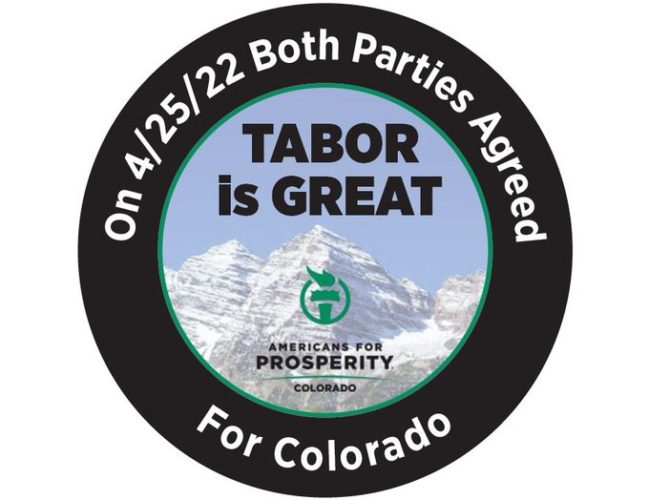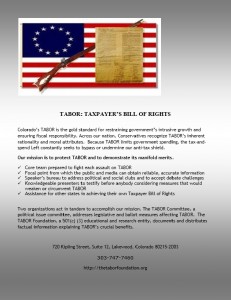
#ItsYourMoneyNotTheirs
#ThankGodForTABOR
#VoteOnTaxesAndFees
#FeesAreTaxes
#TABOR
#FollowTheMoney
#FollowTheLaw
#UnlessLiberalsIgnoreTheConstitution

#ItsYourMoneyNotTheirs
#ThankGodForTABOR
#VoteOnTaxesAndFees
#FeesAreTaxes
#TABOR
#FollowTheMoney
#FollowTheLaw
#UnlessLiberalsIgnoreTheConstitution
The April 20th Title Board Hearing has a notable 60 proposals on the agenda because it’s the last chance to get title set for the 2022 ballot. Although the list of potential ballot issues is long, many are variations with a slight tweak. After title setting, the proponents must do the hard (or expensive) work of getting enough signatures.
Nearly a 1/3 of the proposals pertain to alcohol licensing, sales, and delivery.
Property taxes are another hot topic. Pro-taxpayer advocates are presenting relief in the form of a 2%-3% cap on property taxes.
Bigger government advocates propose a new tax on “Luxury Residential Real Property,” defined as $2 million or more. New revenues would be turned over to government to address affordable housing. On that same theme, there’s a proposal to increase the income tax rate which would be spent on government-overseen affordable housing.
Another group wants to increase taxes from income tax by reducing deductions, putting increased taxation towards free school lunches for certain public schools – an expenditure of $60 – $140 million dollars a year.
Protecting the Taxpayer’s Bill of Rights begins before a ballot issue hits the street. The public can testify at the title setting meeting to get transparent language about the financial effects. If you’ve been around Colorado long enough you know that proponents of tax increases will actually try to have the question read, “without raising taxes” if they can get away with it. As we know, if you end up with less money in your pocket because of a tax policy change, that’s a tax increase.
Currently, there’s a legal battle just filed with the Supreme Court over initiatives #62-65, called Additional Revenue to State Education Fund. Proponents are attempting to claim the measures are not a tax increase. Any of the four variations would reduce or completely eliminate our expected rebates from the Taxpayer’s Bill of Rights over the next two years. Since there is no sunset, we would give up a substantial amount of our future refunds if #62-65 moves forward.
You can find the ballot proposals at the Colorado Secretary of State website under Elections & Voting and Initiatives & Title Board. You’re looking for the section titled Awaiting Initial Hearing.
You can testify remotely. The meeting is Wednesday, April 20 starting at 9 am. https://attendee.gotowebinar.com/register/3996912106274902539
Email the Title Setting Board at initiatives@coloradosos.gov. Emails should be sent by Tuesday midday at the latest. Otherwise, listen in remotely and chime in when it’s time. It’s going to be a long meeting.
Natalie Menten
TABOR Board Member

Senate Bill 260, passed by Democrats in 2021, enacted new fees on gasoline purchases, deliveries and Uber and Lyft rides to raise billions for transportation projects

Colorado’s new transportation fees violate the Taxpayer’s Bill of Rights and several other state finance laws and should be invalidated, two conservative groups and Republican state Sen. Jerry Sonnenberg claim in a long-promised lawsuit filed late Thursday in Denver.
Senate Bill 260, passed by Democrats in the legislature last year, enacted a host of new transportation fees — including on gasoline purchases, deliveries and Uber and Lyft rides — to raise money for road and transit projects across the state.
 There was excellent news last month. It appears the Plaintiffs have decided not to move forward with the existential threat to TABOR, ending the Kerr vs. Polis lawsuit!
There was excellent news last month. It appears the Plaintiffs have decided not to move forward with the existential threat to TABOR, ending the Kerr vs. Polis lawsuit!
The TABOR Foundation has been coordinating a national coalition of 19 freedom organizations that were ready to submit a friend-of-the-court brief to the US Supreme Court. We won’t have to write it after all.
When the 10th Circuit Court of Appeals (sitting en banc) issued its ruling last December that was favorable to our position, you could have bet your bottom dollar that the Plaintiffs would continue the lawsuit. Many left-of-center people and organizations have been pushing this case for over a decade.
The next step in the process would have been for Plaintiffs to petition the Supreme Court for a writ of certiorari asking the Court to take up the case (for a second time). Such a petition had to have been filed by a March 14 deadline, but was not.
The Judgment dismissed the case for failing to state a claim upon which the Court could grant relief for the remaining Plaintiffs, who consisted of a few school districts and other political subdivisions of the State of Colorado. Originally the Plaintiffs also included individual legislators and citizens. The individual legislators had been denied standing to sue because they only alleged institutional injuries to the government and none to themselves as legislators. And the individual citizens did not even allege whether or how TABOR injured them personally.
With respect to the school districts and other political subdivisions, the Court ruled that the US Constitution does not provide political subdivisions with rights against their parent states. Moreover, none of the Plaintiffs identified any other law providing them with a claim for relief to challenge TABOR.
The Court of Appeal’s dismissal was “without prejudice,” so the Plaintiffs could try a new filing. We’ll keep watch just in case.
The heart of the Plaintiffs’ legal theory, that citizens are prohibited from placing restrictions on certain legislative powers, was extremely dangerous to the fundamental principles of limited government.
Friends of the Taxpayer’s Bill of Rights can breathe a sigh of relief and celebrate, for now.
